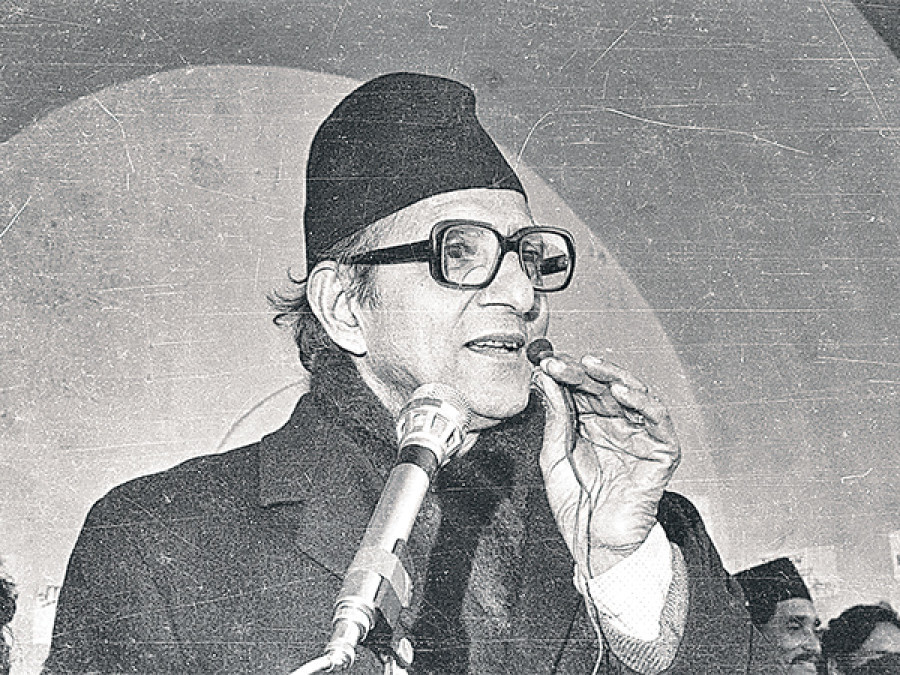Columns
BP’s enduring legacy
Forty-one years after his death, Koirala remains an ideological guru for many.
Sambridh Ghimire
Bishweshwar Prasad Koirala, aka BP, a highly revered political figure in Nepal, embodied a remarkable life story. Having participated in the Indian freedom struggle and led the anti-Rana revolution of 1951, BP fought relentlessly for freedom. He did not only clinch a landslide victory in the 1959 elections, but he was ousted soon after and spent years in prison and exile.
BP’s belief in the wellbeing of every individual fuelled his vision of a society where development would not come at the expense of sacrificing the welfare of the people. An early champion of environmental conservation and sustainable development, BP was familiar with the realities of impoverished farmers’ lives and urged leaders and planners to prioritise their needs when shaping policies and political discourse. These efforts reflect his unwavering dedication to addressing the pressing crises faced by the nation.
Leaders across the political spectrum acknowledge BP’s influence in their political journeys, with Pushpa Kamal Dahal of the Maoist Centre calling him his “Guru” and Rajendra Lingden of the Rastriya Prajatantra Party often quoting his statement, “my neck is tied with the king”. The fact that both the left and right-wing extremists continue to glorify him even after 41 years of his passing is a testament to the enduring relevance of BP’s ideology.
The idea of progress
BP emphasised that progress must always place the human element at its core when considering development. He viewed development not merely as an economic process, but also as a holistic endeavour that involved empowering individuals, ensuring the upliftment of the downtrodden and guaranteeing access to fundamental necessities such as nutrition, shelter, education, healthcare and clothing. He would say, “I want every Nepali to have a house, to possess a farm that sustains them, to own one or two cows, and to secure education and medical treatment for their sons and daughters, thereby preventing needless suffering and loss of life.”
Amid the clamour of ambition and political manoeuvring that engulfs our generation, the echoes of BP Koirala’s profound rural vision reverberate with a resounding absence. Once a guiding light, his visionary leadership is now overshadowed by self-interest and grandiose aspirations. Rather than focusing on big projects like monorails, airports and watchtowers, BP prioritised sustainable production in food grains, milk, fruits, vegetables and clothing. These ideas presented a visionary alternative to prevailing economic policies. In today’s world, there is a fixation on transforming Kathmandu into a replica of Singapore, and one cannot help but ponder the fate of the rural political imagination. Where are leaders who possess the audacity to dream beyond concrete jungles and skyscrapers and instead nurture the fertile soil where the heartbeat of our nation lives?
During his time, middle-class families held comparable economic prowess, and BP aimed to establish a society where the foundation of prosperity was firmly rooted in every household. He recognised the significance of agriculture and rural communities in Nepal and believed that lifting the economic standards of the majority living in rural areas required extensive development campaigns and a robust agricultural sector. His vision entailed empowering farmers and enabling them to transcend the hardships of poverty, ultimately helping them become financially stable and resilient individuals.
BP's 18-month tenure as prime minister, starting in 1959, remains groundbreaking due to the revolutionary measures he undertook. Notably, he abolished the birta system in Nepal, which aimed to provide land to landless farmers who previously relied on contract farming in Tarai. A comprehensive land-related law was enacted to ensure equitable land distribution, accompanied by issuing land deeds to those without land ownership. The slogan "tiller is the owner" encapsulated that landowners should not exceed specified limits, promoting fairness and addressing longstanding disparities.
Nonetheless, despite BP’s efforts, Nepali politicians have consistently failed to follow his advice. The initial betrayal stemmed from their neglect of rural areas and the marginalised. Throughout the 1990s and 2000s, government policies disproportionately focused on urban-industrial sectors, resulting in the decline of agriculture, crafts and, most importantly, primary education ingrained in nativity and tradition. Although the prevailing political class, on the whole, avoided personal corruption, a shift occurred in the late 2000s as politicians began exploiting their positions for personal enrichment and nepotism. This misuse of power engendered deep resentment among the masses, creating an environment conducive to the success of the Maoist movement.
BP’s legacy today
BP’s strong commitment to environmental preservation and sustainable development remains his lasting legacy. Witnessing the rampant deforestation, soil erosion and ruthless exploitation of forests during his return from exile in India in 1976, BP recognised the urgent need for forest conservation and sustainable practices. In 1959, when he became Nepal's first democratically elected prime minister, his government enacted legislation to protect and conserve forests, paving the way for the iconic slogan “Hariyo Ban, Nepal Ko Dhan” (Green forests are Nepal's treasure).
Similarly, BP’s advocacy of nonviolent resistance is a testament to the power of peaceful means towards lasting social change. Recognising the efficacy and sustainability of nonviolent civic resistance, which includes boycotts, mass protests, blockades, strikes and civil disobedience, BP embraced methods of protest influenced by his admiration for Mahatma Gandhi. These nonviolent strategies have proven instrumental in delegitimising authoritarian regimes and eroding their support, as highlighted by a study conducted by the think tank Freedom House, which analysed over 60 transitions to democratic rule since World War II.
Finally, BP’s remarkable public life offers valuable lessons about the significance of transparency, integrity and moral leadership. Unlike contemporary politicians who guard their secrecy and are surrounded by security personnel, BP willingly welcomed visitors from all walks of life into his home. He eschewed deceit and spin, announcing his campaigns well in advance and fearlessly subjecting his social experiments to scrutiny through the pages of his newspapers, engaging in meaningful dialogue with critics.




 22.12°C Kathmandu
22.12°C Kathmandu















